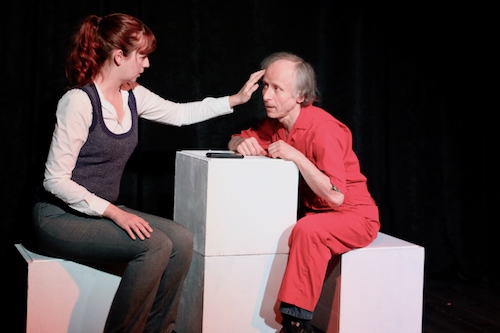 Harrowing play takes to the Toronto stage
Harrowing play takes to the Toronto stage
In the b current studio at Artscape Wychwood Barns, Seven Siblings Theatre presents Bryony Lavery’s compelling play about grief and forgiveness—Frozen. In modern day England, ten year old Rhona is found sexually abused and murdered. Circumstances then conspire to draw three characters together: Nancy (the mother of the murdered girl), Ralph (the murderer) and Agnetha (a visiting American psychologist researching violent criminality in men).
The grisly act at the centre of the story isn’t revealed right away. We are eased in gently with monologues by each of the three main players. Nancy is full of warmth and good humour as she relates the exasperating antics of her two (then both alive) daughters. Agnetha is extremely high strung yet determined as she sets out on her journey to England. And before we know what he’s capable of, Ralph seems intense yet generally amiable.
And then it all turns very dark.
The brutal details of Rhona’s murder are revealed. Nancy struggles though her heartbreak and fury. Ralph, frustrated with being captured, tries to convince us that he’s the misunderstood victim in this situation. Agnetha, struggling with her own grief, searches for the humanity lurking beneath Ralph’s monstrous act.
Scott McCulloch is genuinely frightening as Ralph. He can be extremely vulgar and aggressive, and those moments are awful, sure, but it’s the overall gestalt of him that really got under my skin. Even when he seems calm and civil, it doesn’t feel safe; the least provocation can trigger him and then all bets are off.
As the grieving mother, Nancy McAlear conveys so much in the smallest of gestures. There can be great emotion in the steady and determined act of suppressing that emotion. She doesn’t indulge in hysterics, but the anguish and anger she experiences is conveyed in the way she grips a glass of scotch or holds an old keepsake to her chest.
I found it harder to connect to Agnetha. There’s nothing disingenuous in Madryn McCabe’s portrayal: she displays an endearing quirkiness that conveys Agnetha’s active and creative mind. Her scenes with Ralph are intense and fascinating. She just seemed a little too fresh-faced and incongruous alongside the world-weariness of Nancy and Ralph.
The b current studio space is very tight, and director Will King shrewdly uses this to keep the action contained. He ensures that our focus is on eyes, and on subtle yet meaningful changes in body language. With the exception of key props, there is very little in the way of stuff on stage. Four cubes are moved about to provide a sense of place, but that’s it.
Playwright Lavery wants to immerse us in moral shades of grey, to challenge our perceptions of Ralph and his actions by showing us how past trauma can lead to abhorrent behaviour. I confess, I found it hard to completely buy the forgiveness and acceptance that is found towards the end. I know why it works thematically, but it wasn’t viscerally real to me. These characters tell us they have worked through this moral and emotional dilemma, but I didn’t feel the redemption and peace in my gut, didn’t understand how it came to be.
Despite this, Frozen is a poignant, disturbing play and well-worth your focused attention.
Details:
- Frozen plays until June 3, 2018 at the b current studio in Artscape Wychwood Barns (601 Christie St, #251)
- Shows run Thursday through Sunday at 8:00pm, with a Saturday matinee at 2:00pm
- Tickets can be purchased online
Photo of Madryn McCabe and Scott McCulloch provided by the company.
